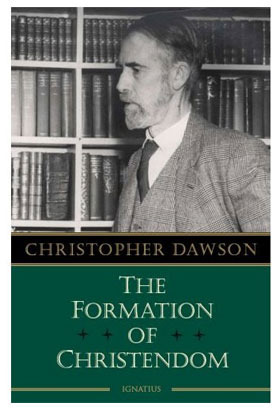"For [Christopher] Dawson is more like a movement than a man..."
That statement by Frank Sheed is just one of several quotes about the great British historian Christopher Dawson (1889-1970) in this fine article by Dr. Bradley Birzer, author of Sanctifying the World: The Augustinian Life and Mind of Christopher Dawson (Christendom Press, 2007):
Though precious few remember him now, Christopher Dawson stood at the very center of the Catholic literary and intellectual revival throughout the four decades preceding Vatican II. "For Dawson is more like a movement than a man," his publisher and friend, Frank Sheed, wrote of him in 1938. "His influence with the non-Catholic world is of a kind  that no modern Catholic has yet had, both for the great number of fields in which it is felt and for the intellectual quality of those who feel it."
that no modern Catholic has yet had, both for the great number of fields in which it is felt and for the intellectual quality of those who feel it."
During the Great Depression of the 1930s, Catholic promoters such as Francis X. Talbot listed Dawson as a select member of America's "Permanent Gallery of Living Catholic Authors." Additionally, prominent American Catholic colleges began teaching courses on the thought of Christopher Dawson and other figures of the Catholic Literary Revival as early as the mid-1930s. Dawson's influence "can be seen on almost every major lay Catholic movement in the American Church between 1930 and 1955," historian Arnold Sparr has written.
In 1933, the American Catholic journal Commonweal stated that "the writings of Christopher Dawson demand the thoughtful attention of all educated men." Six years later, the Jesuit journal, the Month, claimed that to "commend Mr. Dawson's work is unnecessary; nothing that he writes could be unimportant." In 1949, Waldemar Gurian, a refugee from the Nazis and a professor at the University of Notre Dame, wrote that Dawson's "very ability to make brilliant understatements and to display without pride, as something self-evident, his extraordinary broad knowledge make his synthesis particularly impressive."
In 1950, the English Dominican journal, Blackfriars, claimed "that Mr. Dawson is an educator; perhaps the greatest that Heaven has sent us English Catholics since Newman."` Four years later, Frederick Wilhelmsen, himself soon to become a major player in post-war American Catholicism, concluded that Dawson was "the foremost medievalist in the English speaking world." Further, "this union of genius and Catholic scholarship has put us all in his debt."
Read the entire essay, "Christopher Dawson and the 'Twentieth-Century Catholic Literary Revival" on the Paying Attention to the Sky blog. The blog also has a number of excerpts from Dawson's writings.
Dawson's understanding of history and Christianity is captured well in these paragraphs from The Formation of Christendom:
The history of Christianity is the history of a divine intervention in history, and we cannot study it apart from the history of culture in the widest sense of the word. For the word of God was first revealed to the people of Israel and became embodied in a law and a society. Secondly, the word of God became Incarnate in a particular person at a particular moment of history, and thirdly, this process of human redemption was carried on in the life of the Church which was the new Israel--the universal community which was the bearer of divine revelation and the organ by which man participated in the new life of the Incarnate Word.
Thus Christianity has entered into the stream of human history and the process of human culture. It has become culturally creative, for it has changed human life and there is nothing in human thought and action which has not been subjected to its influence, while at the same time it has suffered from the limitations and vicissitudes that are inseparable from temporal existence.
Now there are those who reject this mingling of religion and history, or Christianity and culture, since they believe that religion is concerned with God rather than man, and with the absolute and eternal rather than the historical and the transitory. We certainly need to recognize how important this aspect of religion is and how man has a natural sense of divine transcendence. And we know from the history of religious thought that we do actually find religious men of this kind--men who seek to transcend human nature by the flight of the Alone to the Alone, in the words of the Neo-Platonist philosopher, and who find the essence of religion in the contemplation of pure being or of that which is beyond being.
But this is not Christianity. Although Christianity does not deny the religious value of contemplation or mystical experience, its essential nature is different, it is a religion of Revelation, Incarnation and Communion; a religion which unites the human and the divine and sees in history the manifestation of the divine purpose towards the human race.
Read more on Ignatius Insight.
Also see:
• The Vision and Principles of Christopher Dawson | David Knowles | Introduction to Christopher Dawson's The Dividing of Christendom
• Rediscovering Christopher Dawson | An Interview with Dr. Bradley J. Birzer
Carl E. Olson's Blog
- Carl E. Olson's profile
- 20 followers



